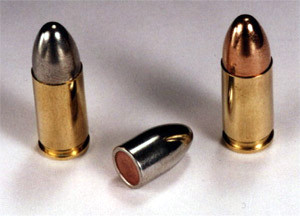We saw last time that caliber is a lot more complicated than the textbook definition of "diameter of the barrel in inches": different calibers are actually different specifications of the size, shape, and weight of the bullet itself as well as the powder charge.
One of the places this is most clearly seen is the comparison between pistol and long rifle ammunition. We recall from last time that a 9mm bullet is really a .38 caliber. That means that a .308 Winchester is really a lower caliber than a 9mm Luger. But a .308 packs a whole lot more punch than a 9mm Luger. The difference is quite clearly seen if we look at the actual cartridges.
The 9mm Luger is a reasonably short round
The .308 is a great deal longer
I can't find a picture of them side-by-side, so we'll have to look carefully: although the .308 bullet and the 9mm bullet are approximately the same diameter, the 9mm round looks much larger in proportion to the cylinder. That's because the 9mm Luger is 19mm long (hence the designator "9X19mm" while the .308 Winchester is 51mm long (recall a .308 Winchester is almost identical to the 7.62X51mm NATO round).
The difference between the lengths of the two cartridges indicates the relative strengths of the powder charges. Not only is the .308 round a whole lot heavier than the 9mm round, it is packaged with a whole lot more powder.
This exemplifies the main difference between pistol and long rifle ammunition: rifle ammunition generally packs a lot more "punch". The 9mm Luger round is expected to have a muzzle velocity in the neighborhood of 370 m/s (somewhere around 1200 ft/s), the .308 is expected roughly to double that with speeds around 800 m/s. If we recall our high school Physics class, we'll remember that kinetic energy is proportional to the square of the velocity, so the .308 carries about four times the energy of the 9mm, without taking into account the difference in bullet mass. We'll discuss that in more detail later.
There are some rifles that use pistol ammunition, like lever guns chambered in .357 Magnum or .44 Magnum. Although they use the less powerful pistol ammunition, they still tend to get a lot more energy out of those same rounds than a pistol would. Why is that?
It actually comes down to the length of the barrel. When a gun is fired, the bullet is forced down the barrel by the expanding gasses produced by the burn of the gunpowder. Once the bullet exits the barrel, it's no longer being pushed by the burn of the powder, and will begin to decelerate immediately because of air resistance. If two identical cartridges are fired from two different guns, the one with the longer barrel accelerates for a longer distance, exiting the barrel with a higher speed. So the longer barrel almost always means a faster (i.e. more energetic) bullet.
I suppose the effective limit of this rule of thumb would be the maximum volume of the expanding gasses. In other words, the powder doesn't expand to an infinite volume when it burns. Whatever the maximum volume of the powder charge's burn is, that's when a bullet would stop accelerating down a barrel. If the barrel's volume were larger than that expansion, then we'd expect the bullet to decelerate rapidly in the barrel due to the friction of the barrel. But I'd expect a barrel that long would be impractical to carry.
So there are two main reasons a rifle hits harder than a pistol: rifle ammunition is packaged with a whole lot more gunpowder to push those bullets, and rifle barrels are longer, so that even when the powder charges are identical, bullets accelerate longer in rifles and thus come out of the muzzle with a lot more energy.
So the next time you hear someone talk about a .50 caliber pistol, don't assume it's more powerful than a .30 caliber rifle. It probably isn't. Even though it might have a ridiculously large bullet, it probably has significantly less powder, and it almost certainly is coming from a shorter barrel.
Subscribe to:
Post Comments (Atom)






1 comment:
Very excellent guidelines! I definitely enjoying every little bit of it I have you bookmarked to check out new stuff you post nice post, thanks for sharing.
9mm Brass
Post a Comment